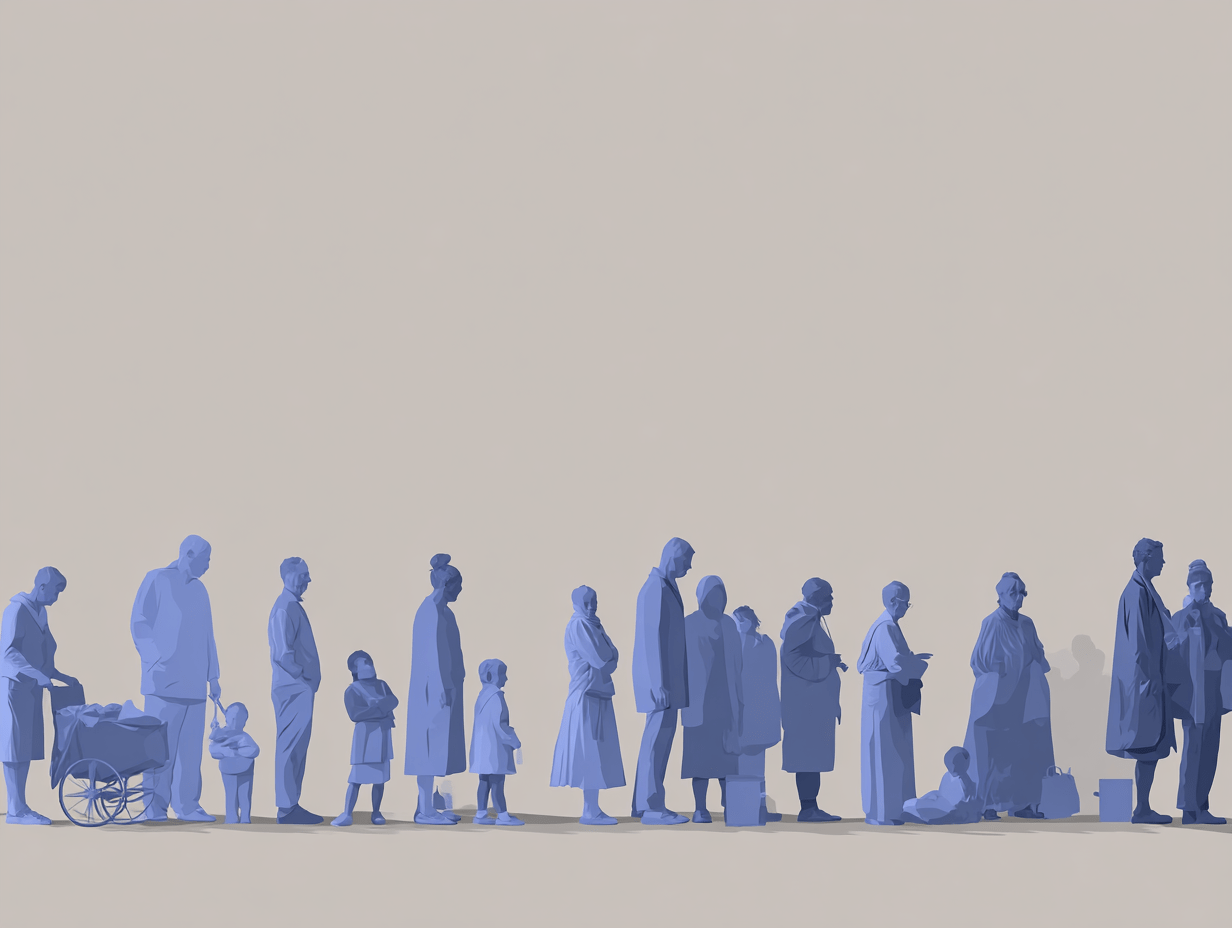A Europe Without Poverty?
Why a binding minimum income must anchor the EU’s anti-poverty strategy. A commentary by Pietro Galeone.

Pietro Galeone is among the organisers of the forthcoming policy-oriented event “The EU’s Anti-Poverty Strategy: An Evaluation and Next Steps,” to be held at Bocconi on 20 October, co-promoted by the Institute for European Policymaking at Bocconi University and the European Commission. The event will also inform the preparations for the World Social Summit (Doha, 4–6 November). Further details, including the programme and registration, are available here
Every year, October 17th marks the UN’s International Day for the Eradication of Poverty. In 2025, this date carries particular weight for Europe, as it stands at a crossroads. On the one hand, the European Commission has launched its first-ever Anti-Poverty Strategy – a necessary plan in a continent where more than 94 million people remain at risk of poverty or social exclusion.
On the other hand, Europe’s welfare systems look rather patchy and too often insufficient, fragmented across member states while inequality widens, geopolitical tensions and defense expenditures mount, inflation lingers, and the green and digital transitions create new vulnerabilities.
The exact content of the EU's anti-poverty strategy is not yet public: the Commission has launched a consultation on the subject until the end of the year, with a pit-stop in Milan for an event co-organized by the Commission's DG Employment and the Institute for European Policymaking at Bocconi University on October 20th.
At the heart of any credible welfare architecture sits minimum income: the last line of defense against absolute poverty. And it is precisely on minimum income that focuses a report drawn up alongside colleagues Massimo Aprea (La Sapienza University), Michela Braga (Bocconi University) and Michele Raitano (La Sapienza University) on behalf of Caritas Europe, entitled "Thriving, not just surviving" (2025). The report follows a push towards a more binding European policy on minimum income mechanisms, in the path of the 2023 EU Council Recommendation.
The EU’s 2023 benchmark—and its limits
On 30 January 2023, the EU Council adopted the Recommendation on “Adequate minimum income ensuring active inclusion.” Its twin aims are clear.
First, to ensure anyone lacking sufficient resources receives an adequate income floor.
Second, to tie such support to measures that enable social participation and labor-market inclusion for those who can work, alongside access to enabling services such as healthcare, housing, and education.
Adequacy is the linchpin. Benefits should permit a dignified life across the whole life-cycle, calibrated to living costs, the lowest wages or statutory minimum wages, purchasing power, and household needs. Member states are urged to set levels that meet these criteria by 2030 and to review them regularly to reflect inflation and economic change.
Access matters too. Eligibility rules should be transparent and non-discriminatory, without disproportionate residence or asset tests and other arbitrary hurdles.
Minimum income should be combinable with other benefits and essential services; access should not be thwarted by red tape, long procedures, or linguistic, digital, and administrative barriers.
Finally, Brussels envisaged EU-level monitoring—via new indicators in the European Semester’s social scoreboard—and country-specific recommendations where adequacy or access fall short.
But recommendations are sadly not binding. Their effectiveness depends on national political will. That is why NGOs, social-economy organizations and EU-wide anti-poverty networks have long urged institutions to be more ambitious: minimum legal obligations, not merely exhortations.
What Caritas finds: inadequate by design, obstructed in practice
Caritas’ CARES report outlines a stark finding. Data shows that nowhere in the Union do current schemes manage to lift beneficiaries up to the relative-poverty threshold – measured as 60% of median income. Even among the best performers – Denmark, Finland, Ireland – transfers fall short; in other countries, such as Romania and Hungary, adequacy falls at just 20-30% of the threshold. The result is that millions of households remain economically insecure even after qualifying for state support.
Front-line testimonies from Caritas organizations across Europe tell a consistent story: benefits often fail to cover even the most essential expenses: energy bills, food, transport, childcare, housing. Roughly 90% of national Caritas providers surveyed say that their countries’ subsidies are insufficient relative to real living costs.
Access barriers compound the problem. Complex bureaucracy, tight residence requirements, asset tests that penalize even modest home ownership, and categorical rules that exclude entire groups result in between 30 and 50% of non-take-up: i.e. those entitled to the benefit never actually access it – blocked not by choice but by administrative hurdles, poor information, or fear of stigma.
Unsurprisingly, the 2023 Recommendation has barely had any effect. Three quarters of the countries examined have made no substantive changes since its adoption. In some cases – most notably Italy – the trajectory has even gone in the opposite direction.
Caritas therefore argues for a binding EU framework – ideally a directive – establishing minimum common standards without forcing uniformity. Three pillars should underpin it:
- Adequacy: benefit levels anchored to at least 60 per cent of national median income, indexed automatically to inflation;
- Access: universal, non-discriminatory eligibility, with streamlined procedures and meaningful take-up;
- Integration: linkage to enabling services—training, healthcare and housing—so minimum income supports active inclusion rather than mere subsistence.
Italy’s U-turn
Italy offers a cautionary tale. The 2019 Reddito di Cittadinanza was created as an anti-poverty tool. In 2023, it was replaced by the Assegno di Inclusione (ADI). Both are means-tested, but ADI adds rigid categorical filters: eligibility is largely limited to households with a minor, a person with disabilities, someone over 60, or those already in contact with social services.
The upshot is predictable. Hundreds of thousands of poor households – including the working poor with very low wages – have been excluded despite having incomes below the threshold, on the premise that “employable” adults should not receive income support unless they can prove the immediate impossibility of work.
The logic runs counter to the universal safety-net principle implicit in the EU’s 2023 Recommendation: any household lacking adequate resources should qualify for a guaranteed minimum. Italy has effectively halved coverage just as Brussels urges broader reach and higher adequacy. Indexation is missing, so real benefit values will erode further over time.
Beyond borders: a question of dignity—and EU credibility
Minimum income is not charity and not a work disincentive. It is a social right – codified in Article 34 of the EU Charter of Fundamental Rights – that should enable genuine participation in economic, social and cultural life. In that light, the Commission’s forthcoming Anti-Poverty Strategy is a historic opportunity. Its success will hinge on making robust minimum-income schemes a non-negotiable pillar, with common, enforceable criteria. As ever in social policy, the challenge is to reconcile national competence with a credible EU framework.
President Ursula von der Leyen’s State of the Union address on 10 September 2025 moved the issue from rhetoric towards strategy, calling for the elimination of poverty by 2050 – an agenda that aligns social cohesion, cost-of-living relief, job quality and social protection. That ambition will ring hollow unless minimum income is embedded in the next EU budget and in labour, social-rights and equality files—not left to uneven national politics.
A previous version of this article was published by the Italian monthly magazine ECO
IEP@BU does not express opinions of its own. The opinions expressed in this publication are those of the authors. Any errors or omissions are the responsibility of the authors.
